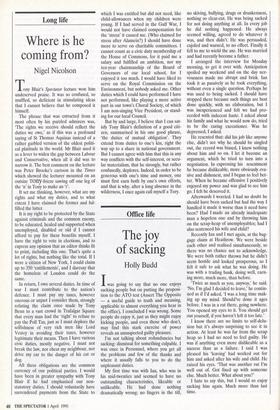Office life
The joy of sacking
Holly Budd
Iwas going to say that no one enjoys sacking people but on putting the proposi- tion to the ATO test (Assert The Opposite — a useful guide to truth and meaning, applicable to almost everything you hear in the office), I concluded I was wrong. Some people do enjoy it, just as they might enjoy kicking people, and even those who don't, may find this stark exercise of power reveals an unsuspected guilty pleasure.
I'm not talking about redundancies but sacking: dismissal for something culpable. I was once in Personnel, where you get all the problems and few of the thanks and where it usually falls to you to do the unpleasant duties.
My first time was with Ian, who was in his mid-twenties and seemed to have no outstanding characteristics, likeable or unlikeable. He had done nothing dramatically wrong; no fingers in the till, no skiving, bullying, drugs or drunkenness, nothing so clear-cut. He was being sacked for not doing anything at all. In every job he did nothing happened. He always seemed willing, agreed to do whatever it was, and then didn't. He was persuaded, cajoled and warned, to no effect. Finally it fell to me to wield the axe. He was married and had recently become a father.
I arranged the interview for Monday morning, to get it over with. Anticipation spoiled my weekend and on the day ner- vousness made me abrupt and brisk. Ian took it as passively as he took everything, without even a single question. Perhaps he was used to being sacked. I should have stopped there because such things are best done quickly, with no elaboration, but I was inexperienced and felt we had pro- ceeded with indecent haste. I asked about his family and what he would now do, tried to be the caring executioner. Was he depressed, I asked.
He resented that: did his job like anyone else, didn't see why he should be singled out, the record was biased, I knew nothing about him and so on. I let it become an argument, which he tried to turn into a negotiation. In expressing his resentment he became dislikeable, more obviously eva- sive and dishonest, and I began to feel bet- ter. When he became offensive I positively enjoyed my power and was glad to see him go. I felt he deserved it.
Afterwards I worried. I had no doubt he should have been sacked but had the way I handled it made it worse than it need have been? Had I made an already inadequate man a hopeless one and by throwing him on the scrap-heap of unemployables; had I also sentenced his wife and child?
Recently Ian and I met again, at the bag- gage claim at Heathrow. We were beside each other and realised simultaneously, so there was no chance not to acknowledge. We were both rather thrown but he didn't seem hostile and looked prosperous, so I felt it safe to ask what he was doing. He was with a trading bank, doing well, earn- ing more, much more, than before.
`Twice as much as you, anyway,' he said. `No, I'm glad I decided to leave,' he contin- ued as if I'd asked, 'I was a long time mak- ing up my mind. Should've done it ages before. I was in a rut there, going nowhere. You opened my eyes to it. You should get out yourself, if you haven't left it too late.'
I know there are no limits to self-delu- sion but it's always surprising to see it in action. At least he was far from the scrap heap so I had no need to feel guilty. He was if anything even more dislikeable as a success than as a failure. I said I was pleased his 'leaving' had worked out for him and asked after his wife and child. He raised his eyes. 'That was another rut I'm well out of. Got fixed up with someone else. Much better. What about you?'
I hate to say this, but I would so enjoy sacking him again. Much more than last time.


























































 Previous page
Previous page